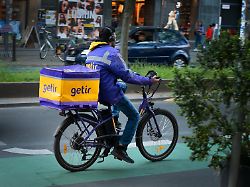“Quick Commerce” is weakening
Delivery service Getir deletes every ninth position
08/22/2023 2:29 p.m
The Getir delivery service delivers groceries to the front door within minutes – a service that has become popular during the corona pandemic. But Corona is over and you can’t really earn a lot of money because of the high costs. The takeover of competitor Gorillas is now likely to cost 2,500 employees their jobs.
The food delivery service Getir wants to part with around 2,500 employees. The company announced this. According to this, the company currently employs around 23,000 people in five countries, which means that around one in nine jobs will be lost. The company did not say how the job cuts were distributed across countries.
The company justified the cuts by significantly increasing efficiency. “Decisions like these are never made lightly,” Getir explained. This is not associated with any further withdrawal from one of the remaining five countries. Getir will remain represented in Turkey, Great Britain, Germany, the Netherlands and the USA.
The Turkish delivery service is active in the “quick commerce” sector, where customers can use an app to have supermarket products delivered to their own front door within a short time. This business boomed during the Corona pandemic, young people in large cities in particular used the new delivery options, after which interest dropped noticeably.
Raised with takeover?
The sometimes fast-moving suppliers on their bicycles increasingly caused discussions in the cities about the safety of pedestrians and other road users. In addition, there was and is a lot of criticism of the working conditions for the suppliers.
Just a few weeks ago, Getir announced that the delivery service from Spain, Portugal and Italy wanted to withdraw completely. At the time, it was said that this would allow the financial resources to be concentrated on the existing markets, where the chances of profits and sustainable growth were greater. 96 percent of sales came from the five core markets anyway. It was not known how many jobs were cut as a result. At that time it was said that the company wanted to focus its business in Europe primarily on Germany.
In Germany, Getir took over the competitor Gorillas some time ago. According to the website, the Gorillas brand currently delivers groceries in more than 20 German cities, and the Getir brand travels through ten German cities according to its online presence. The company announcement did not state whether the delivery service will now withdraw from individual German cities. In view of the large number of jobs that are to be eliminated, this is likely.
According to a report by “Gründerszene” and “Business Insider”, the takeover of the gorillas also plays a role in the job cuts: “In discussions, several people from Getir’s corporate environment expressed the suspicion that, given the actual numbers of gorillas, one was subsequently hired paid too high a price for the company.” So austerity measures are necessary.
Getir faces growing competition
Speculations have been raging for months about the further financing of the start-up. At the end of July, Getir said that a round of financing was about to be completed. This is no longer mentioned in Tuesday’s message.
The quick commerce business is considered controversial overall. Above all, skeptics complain about high costs with comparatively little profit. For example, corporations like Delivery Hero, based in Berlin, have to pay high rents for the centrally located department stores. However, couriers can only deliver the goods to the customers in a short time if they have particularly attractive locations. In addition, the corporations spent a lot of money on advertising to make customers aware of the new offer in the first place.
Despite the already difficult business, Getir has faced further competition in recent months. The Lieferando service, which actually specializes in restaurant deliveries, has now also included food and household products in its range – for example through cooperation with Getir. Even services originally designed for the delivery of beverages are increasingly offering a wide range of food and snacks.
The fast deliveries do not promise large margins, so the companies are looking closely at the costs. The union of food, enjoyment and restaurants regularly criticizes the fact that savings are being made when it comes to paying drivers. The union called the “riders” from Lieferando for the first time in April. So far, the two sides have not been able to agree on a collective agreement.
